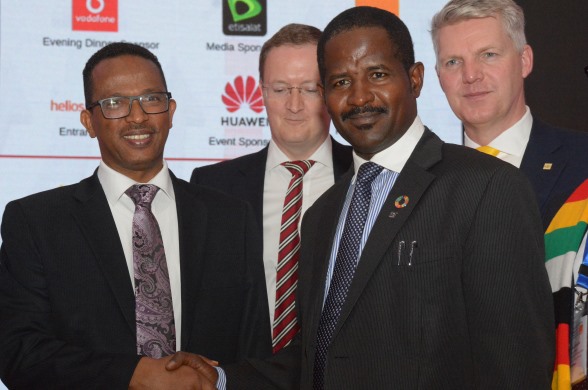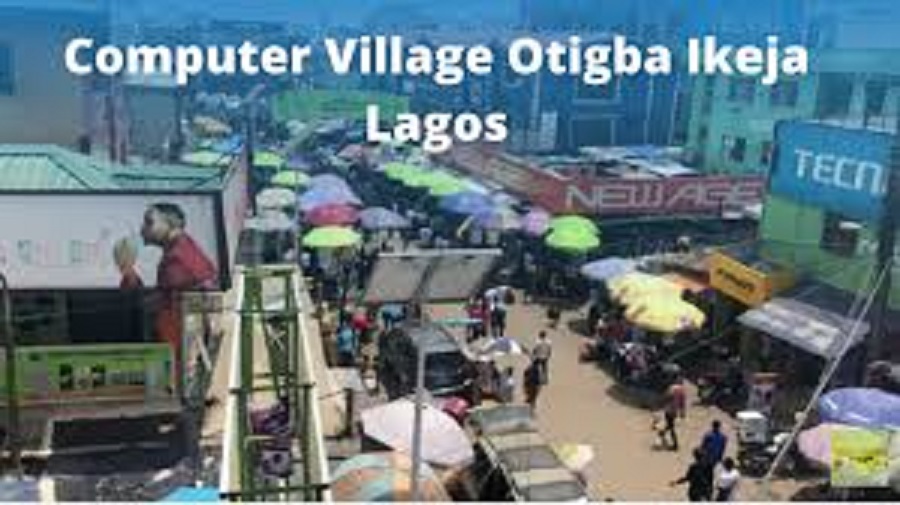News
Gwandu Urges Ethiopia to Learn from Nigeria’s Telecom Deregulation

Dr. Bashir Gwandu, non-executive chair of the Commonwealth ITU Group (CIG) and the former commissioner of the Nigerian Communications Commission (NCC), has advised Ethiopia to learn from Nigeria as it moves ahead to liberalize its telecommunications industry for private sector investment.
Dr. Gwandu stated this while delivering his lead keynote speech at the opening of the Innovation Africa Digital Summit (IAD) 2019 in Addis Ababa last week graced by telecoms executives and governments from Africa and around the world.
Senior executives from Vodacom Group, MTN Group, Etisalat, Safaricom, France Orange, Vodafone, ZTE, Huawei, Ericsson, Cisco, Airbus, Helios Towers, OneWeb, Mastercard, Intelsat, Thuraya, IBM, IFC, and several others attended the summit which also attracted Ministers from Africa, most especially the West and East Africa sub-regions.
The summit was opened by Ethiopian Prime Minister Abiy Ahmed accompanied by some of his Ministers. It was anchored by Extensia of the UK -co-organiser of the IAD Summit. The period of the conference coincided with the time a proclamation is being tabled before the Ethiopian Parliament for debate and consideration to liberalise the country’s telecom sector.
According to Reuters, Ethiopia’s telecoms market is considered to be ‘the big price’ and the last greenfield site in a push to liberalise, and end a state monopoly as well as open-up one of the world’s last major closed telecoms markets.
In his speech at the conference, Dr. Gwandu dissected the telecoms market privatisation and liberalisation processes breaking the issues logically from the point of producing succinct legal frameworks for both the privatisation, and that of the telecoms regulation, right down to the market design and to the choices available to the government when it comes to competition planning up to the spectrum management and eventually service providers regulation.
He stated the need for strong and good regulatory framework, encompassing sensible set of rules that encourages investment and protects the consumer and requiring, effective, professionally competent and sufficiently empowered as well as sufficiently financed regulatory institution.
He emphasize that “Good enable laws are not just sufficient but government support must be total and not half-hearted, coupled with adequate funding that would attract good manpower to the regulator.”
Dr. Gwandu, a former acting executive vice chairman at NCC opined that government role should be restricted to policy formulation whilst a strong, independent regulatory authority should provide stable, transparent, fair, and non-discriminatory access to telecommunications resources in a timely manner.
He said the legal framework apart from guaranteeing independence of the regulator, must enable flexibility of the regulator whist remaining predictable, efficient, effective and accountable. “It should be the role of the regulator to ensure the existence of competition in all segments of the market devoid of market abuse or the exercise of significant market power by the participants” he said.
Gwandu emphasized that, “Liberalization of telecom market is essential for rapid network growth as experienced by other countries and private sector participation is essential for attracting investment. Innovation and new technologies in the telecoms sector is fast moving, it cannot wait for slow government bureaucracy to be approving investment funding and yet compete effectively.”
Bashir Gwandu stated that in looking holistically at the telecoms market, international segment should be examined where the complimentary options of international optical fibre and satellite links can be made available in a competitive manner.
According to him, international gateway liberalization and national backbone planning should ensure ubiquitous availability, open access, and finally on the last mile the spectrum remains key in view of the lack of sufficient last-mile fixed infrastructure.
He further stated that “Mobile is the largest technology platform in human history and mobile broadband is the most dynamic segment of the last mile market. Spectrum is a critical resource for mobile broadband but is only valuable if it is effectively deployed to enable appropriate networks and services for socio-economic benefits to citizens.”
Gwandu emphasised further that as wired infrastructure is limited in Africa except perhaps in South Africa, it is expensive to install. Wireless technology on the other hand is easier and faster to deploy and remains critical to expanding broadband access, and spectrum access is critical for wireless broadband deployment, and capacity.
“Robust wireless broadband requires various bands and appropriate slots size for assignment, the slot size determines how many towers an operator will need to cover the area, or re-use pattern or indeed how soon break-even will happen, how sustainable or profitable the telco will be etc” he said. He cited the mistake made by Nigeria in providing just over three megahertz (MHz) to Code Division Mobile Access (CDMA) operators and expected them to perform.
At the international level, he encourage Ethiopia to participate actively in the International Telecommunications Union (ITU) and African Telecommunications Union (ATU) activities to enhance regulatory harmonisation, thereby promoting economies of scale and enhancing cooperation on roaming, interoperability, Internet exchange points, and development of backhaul infrastructure.
He posited that Ethiopia should align spectrum release and technology neutrality roadmap to enable flexibility in investment, and in spectrum auction process, he advised the government to set objectives properly and to balance pricing of spectrum with rollout obligations.
“For rapid expansion of networks, Ethiopian government which controls land across the country should streamlined approval for Right of Way (RoW) and site acquisition, and to make the process a simple and one-stop shop activity” he admonished.
He also stated that tax holiday has proven to be useful in some markets but even more importantly, multiplicity of sector specific taxes should be avoided and that the multiplier effect of deferred-taxation will lead to more tax revenue from the sectors that are supported by the telecoms.
Furthermore, Gwandu stated that competition planning should be examined carefully so that resulting companies should remain sustainable –and in selling spectrum, the regulator should ensure appropriate sizes, and also not to sell out all available spectrum at once, which will reduce chances of corrective measures in respect of future competition corrective-intervention.
The Ethiopian government thought it wise to invite telecoms experts from around the world, potential Investors and other market players to partake in the unique forum that examined the best practices that the country can learn from, in its quest to restructure and open its telecoms market for foreign participation.
News
JAMB Waxes Worriedly over Rising Digital Exam Fraud

Joint Admissions and Matriculation Board (JAMB) has called for radical and urgent interventions to curb the rising wave of sophisticated digital examination fraud in Nigeria.

JAMB warned that the trend can cause long-term damage to the country’s education system.
Prof. Is-haq Oloyede, JAMB Registrar, made this call during a recent event in Abuja, as reported in the JAMB Bulletin published Monday.
Oloyede described the evolving tactics employed by fraudsters during the 2025 Unified Tertiary Matriculation Examination (UTME) as “worrisome, highly sophisticated, and capable of jeopardising national development.”
“Malpractice is not only compromising learning and research, it is endangering our collective future,” Oloyede warned.
“There is an urgent need for decisive action on these new and disturbing developments. The public must not treat this menace with levity.”
He lamented that instead of addressing the growing problem, “some people are dissipating their energies on spreading unhelpful conspiracy theories and hatred, while our future is being jeopardised by a new crop of sophisticated digital fraudsters.”
The registrar detailed how high-level examination malpractices were uncovered during the 2025 UTME, leading to the withdrawal of some results and the arrest of several culprits nationwide.
According to him, JAMB discovered that certain Computer-Based Test (CBT) centres and school proprietors had colluded with hackers to gain remote access to candidates’ systems and submit pre-programmed answers to local servers at compromised centres.
Oloyede also highlighted the use of AI-enabled photo blending to impersonate candidates, noting that many of the impersonators were current undergraduates. Other fraudulent tactics included:
He said they also include registration with combined fingerprints through the combination of fingerprints from multiple persons for a single candidate’s registration.
He cited the extension of local area networks from some dubious centres to remote “strong rooms” as well as the pairing of candidates with professional mercenaries to gain access to the examination hall.
He revealed that over 3,000 candidates have been identified as either accomplices or beneficiaries of these crimes, stressing that many of them are university students already enrolled in institutions.
News
SERAP Sues NNPC over Alleged Missing ₦500Bn, Seeks Accountability

Socio-Economic Rights and Accountability Project (SERAP) has filed a lawsuit against the Nigerian National Petroleum Company (NNPC) Limited over its failure to account for the alleged missing ₦500 billion, which the company reportedly failed to remit to the Federation Account between October and December 2024.

SERAP’s legal action comes after allegations made by the World Bank, which revealed that out of the ₦1.1 trillion generated from crude sales and other income sources in 2024, NNPC only remitted ₦600 billion.
This left a deficit of ₦500 billion, which remains unaccounted for.
According to the lawsuit filed at the Federal High Court in Lagos on Friday, the organisation is demanding that NNPC explain the whereabouts of this missing amount.
The suit, number FHC/L/MSC/553/2025, seeks to compel NNPC to account for the missing funds.
In the legal documents, SERAP is asking for an order of mandamus to direct NNPC to account for the alleged missing ₦500 billion.
The organisation also wants the court to instruct NNPC to invite appropriate anti-corruption agencies to investigate the spending and whereabouts of the funds.
Furthermore, SERAP requests that those responsible for the missing money be identified, held accountable, and handed to relevant authorities for investigation and prosecution.
The lawsuit follows NNPC’s response to SERAP’s Freedom of Information (FoI) request, where the company argued that the FoI Act does not apply to it.
NNPC’s lawyers, Afe Babalola and Co, claimed that the company is exempt from the FoI Act.
SERAP, however, argues that the NNPC must comply with the Nigerian Constitution and the Freedom of Information Act, along with international human rights and anti-corruption standards, in exercising its statutory functions.
In the suit, SERAP emphasizes that the missing funds have significantly contributed to Nigeria’s economic instability, including the country’s high deficit spending and crippling debt crisis.
The organisation argues that the NNPC’s failure to remit these funds has worsened an already precarious economic situation.
SERAP also stresses that the missing oil revenues reflect a broader failure in NNPC’s accountability and transparency. The organisation highlights that the company’s continuing disregard for these principles damages the country’s economic well-being and governance systems.
The lawsuit also references a recent Supreme Court ruling, which declared that the Freedom of Information Act applies to public records in the Federation, including those kept by NNPC. SERAP calls on the court to enforce the application of this ruling in the case at hand.
The suit filed on behalf of SERAP by its lawyers, Kolawole Oluwadare, Ms Oluwakemi Oni, and Ms Valentina Adegoke, read in part, “Nigerians continue to bear the brunt of these missing public funds from the NNPCL meant for the economic development of the country.”
“There is a legitimate public interest in providing the details sought. The NNPC has a legal responsibility to account for and explain the whereabouts of the missing oil money.”
“The country’s oil wealth ought to be used solely for the benefit of the Nigerian people, and for the sake of the present and future generations.”
“Without the full recovery and remittance of the missing ₦500 billion oil revenues, the dire economic situation may worsen and Nigerians will continue to be denied access to basic public goods and services.”
“Nigerians have the right to know why the NNPCL failed to remit the subsidy removal savings to the Federation Account, and why the NNPCL is deliberately denying states and local governments their allocations from the Account, contrary to the provisions of the Nigerian Constitution.”
“The failure by the NNPCL to remit the money to the Federation Account is a grave violation of the public trust and the provisions of the Nigerian Constitution, national anticorruption laws, and the country’s anticorruption obligations.”
“Despite the country’s enormous oil wealth, ordinary Nigerians have derived minimal benefit from oil money primarily because of widespread grand corruption, and the entrenched culture of impunity of perpetrators.”
“Combating the corruption epidemic in the oil sector would alleviate poverty, improve access of Nigerians to basic public goods and services, and enhance the ability of the government to meet its human rights and anti-corruption obligations.”
“The Nigerian Constitution, Freedom of Information Act, and the country’s anti-corruption and human rights obligations rest on the principle that citizens should have access to information regarding the spending of their commonwealth.”
“The Auditor-General of the Federation and Nigeria Extractive Industries Transparency Initiative (NEITI) have for many years documented reports of disappearance of oil money from the NNPCL.”
“The World Bank recently disclosed that out of the N1.1tn revenue from crude sales and other income in 2024, the NNPCL only remitted N600bn, leaving a deficit of ₦500bn unaccounted for.”
“The revenue and other income were expected to be paid into the Federation Account and shared by all levels of government but the NNPCL reportedly failed to do so.”
“SERAP notes that Section 15(5) of the Nigerian Constitution requires public institutions to abolish all corrupt practices and abuse of power.”
“Section 13 of the Nigerian Constitution imposes clear responsibility on the NNPCL to conform to, observe and apply the provisions of Chapter 2 of the Constitution.”
“Nigeria has made legally binding commitments under the UN Convention against Corruption to ensure accountability in the management of public resources. Articles 5 and 9 of the UN Convention against Corruption also impose legal obligations on the NNPCL to ensure proper management of public affairs and public funds.”
“These commitments ought to be fully upheld and respected.”
“The missing oil revenue has also impeded Nigerians’ ability to enjoy their economic and social rights, and denied them access to essential public goods and services, especially at the time of the cost of living crisis in the country.”
“Had the NNPCL accounted for and remitted the alleged missing ₦500 billion to the Federation Account, it is likely that more funds would have been allocated to the fulfilment of economic and social rights, such as increased spending on public goods and services.”
“The Freedom of Information Act, Section 39 of the Nigerian Constitution, article 9 of the African Charter on Human and Peoples’ Rights and article 19 of the International Covenant on Civil and Political Rights guarantee to everyone the right to information on the whereabouts of the missing ₦500 billion of oil revenue.”
No date has been fixed for the hearing of the suit.
News
Ikeja Computer Village Begins Biometrics Registration to Tackle Crime

The leadership of Computer Village, Ikeja, has begun a biometric registration and enumeration exercise to sanitise the market, curb criminal activity, and restore investor confidence.

In a statement, Abisola Azeez, Iyaloja, described the initiative as part of a broader rebranding effort to address issues like phone snatching, fraudulent technicians, and substandard goods.
It stated, “The market’s leadership announced the move after a recent security incident led the Lagos State Task Force to consider a complete shutdown. However, market representatives intervened to safeguard legitimate traders. Under the new rules, only registered vendors with ID cards displayed at their stalls will be allowed to operate.
Approved street setups will be limited to plastic chairs, show glasses, and umbrellas, while wooden structures and open flames are banned to reduce fire hazards.”
Adeniyi Olasoji, baba Oja, noted the market’s damaged image, emphasising new security measures like CCTV, emergency alert systems, and increased collaboration with law enforcement.
“Other leaders, including Prince Tony Nwakeze, Ralph Chibuzor, Ben Onuorah, Nofiu Akinsanya, and Ikani Tony, affirmed the move as essential for transforming Computer Village into a structured, globally competitive digital hub.
The registration will be completed within two months, after which only verified traders will be allowed to operate.
Meanwhile, Fidelix Ezeugwu, executive secretary of the Ikeja Market Board, emphasised the market’s unified leadership, comprising representatives from four major ethnic groups, and the importance of updated data to align with global standards.
He said, “Additional upgrades include installation of walkie-talkies for improved communication, enhanced street lighting, and CCTV cameras to monitor activity.
“These improvements aim to position Computer Village as a world-class market, comparable to international hubs like Dubai and Singapore.”

 E-Business1 day ago
E-Business1 day agoFarmers to Get Identity Card for Loans, Inputs

 Telecom1 day ago
Telecom1 day agoARCON Probes 9mobile over Alleged N1Bn Advertising Debt

 News1 day ago
News1 day agoSERAP Sues NNPC over Alleged Missing ₦500Bn, Seeks Accountability

 News1 day ago
News1 day agoFirst Asset Management Receives 2024 Fund Manager Award

 E-Business1 day ago
E-Business1 day agoDyna.Ai Launches Operations in Nigeria

 General News1 day ago
General News1 day agoNigeria Relaunches National Talent Export Programme to Unlock $1 Trillion Global Outsourcing Market

 Telecom1 day ago
Telecom1 day agoNiRA Holds 17th AGM, Elects New Leadership to Propel .ng Domain Growth

 General News1 day ago
General News1 day agoFG Plans Special Court for Exam Cheats


























